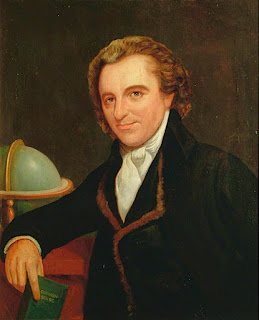The Pen and the Revolution: The Life and Legacy of Thomas Paine
Thomas Paine, a name synonymous with the American Revolution and the fight for independence, was a man whose writings and ideas shaped history. Born on January 29, 1737, in Thetford, Norfolk, England, Paine's early life was humble and unremarkable. His father, a Quaker, and his mother, an Anglican, raised him in an environment of religious tolerance, an influence that would later reflect in his works advocating for freedom and equality. Paine's primary education allowed him to become an apprentice in his father's corset-making trade. However, his destiny lay far beyond the confines of a corset maker's workshop.
Paine's journey to America in 1774, at the age of 37, marked the beginning of his profound impact on the American Revolution. He arrived in Philadelphia, a city bustling with revolutionary fervor. Here, Paine found his true calling, not as a craftsman but as a writer and thinker. His pamphlet, "Common Sense," published in January 1776, was a tour de force that argued for American independence from Britain. Written in a language accessible to the common man, it sold nearly 500,000 copies, galvanizing public opinion and turning the tide toward revolution.
"Common Sense" wasn't just a call for independence but a groundbreaking work that challenged the established political order. Paine's arguments for a representative government, free from the yoke of monarchy, were revolutionary. He believed in the power of the people to govern themselves, a radical idea at the time that laid the groundwork for modern democracy.
Paine's influence wasn't confined to his writings alone. He served as a soldier in the Continental Army and worked as a secretary to the Committee for Foreign Affairs in the Continental Congress. However, his tenure in this office was short-lived due to a scandal involving leaking sensitive documents.
The later part of Paine's life was as tumultuous as his earlier years were influential. His involvement in the French Revolution and his controversial religious views expressed in "The Age of Reason" led to a decline in popularity. Paine died in New York City on June 8, 1809, primarily ostracized and in relative obscurity.
Despite his ignominious end, Thomas Paine's legacy endured. His ideas on liberty, democracy, and human rights continued to inspire generations long after the American Revolution. His writings played a crucial role in shaping the American identity, emphasizing the values of freedom and equality.
Paine's impact on America is immeasurable. His words not only incited a revolution but also laid the philosophical foundation for the Declaration of Independence and the United States Constitution. He was a visionary who saw beyond the immediate struggles of his time, advocating for a society where all men were created equal, with the right to life, liberty, and the pursuit of happiness.
In the annals of American history, Thomas Paine stands as a beacon of revolutionary thought. His life, a tapestry of triumphs and tribulations, is a testament to the power of ideas and the role of the individual in shaping history. From the humble beginnings in Norfolk to the tumultuous streets of Revolutionary America, Paine's journey encapsulates the spirit of an era that forever changed the world.



Comments
Post a Comment